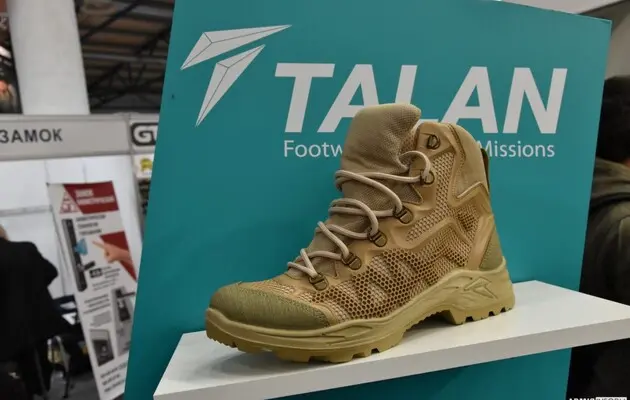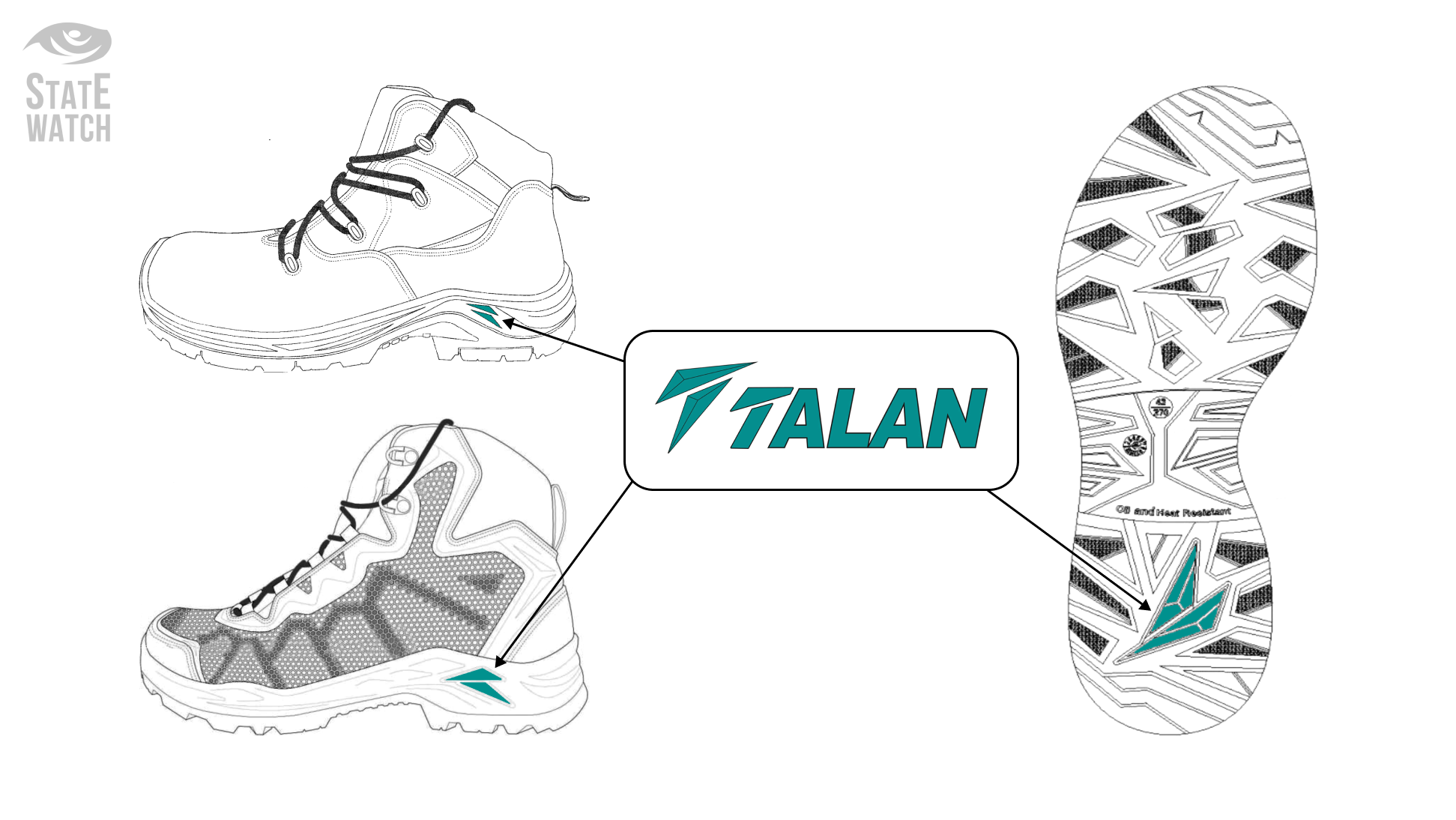Real Talan-t: How Manufacturer of Combat Boots from Sumy Dominates MoD Purchases for Years

Three years into the great war, only one player dominates the billion-dollar market of military footwear: Talan, a combat boots manufacturer. Why did this happen? StateWatch has analyzed the requirements and technical specifications used by the Ministry of Defense of Ukraine to conduct tenders for the purchase of boots. The conclusions are disappointing: the technical specifications, which should be a guarantee of reliable supplies, actually block the participation of other shoe manufacturers in MoD purchases.
Only one manufacturer supplies summer, winter high-top and special boots for the army. The technical specifications for these shoes are developed by the Central Directorate for the Development and Maintenance of the Material Support of the Armed Forces of Ukraine, which, for some reason, adds drawings of shoes with the logo of the Talan company. Technical specifications are important in the tender process because they determine the criteria by which the customer evaluates whether the products of the potential supplier meet his needs. Therefore, such a small detail as a logo can ultimately prevent other manufacturers from participating in government procurement of army footwear.
For reference. Since at least 2015, boots for the Ministry of Defense have been supplied by the Talan group of companies (in particular, Talanlegprom LLC, Talanprom LLC), which belongs to the family of Mykola Lavryk, ex-governor of Sumy region and People's Deputy of the 8th convocation from the Petro Poroshenko Bloc. In the period from 2011 to 2017, Talanlegprom was systematically accused of violating the terms of delivery according to the lawsuits of the Ministry of Internal Affairs and the Ministry of Internal Affairs of Ukraine. In 2017, the Odesa regional territorial branch of the Antimonopoly Committee (AMCU) established that Talanlegprom LLC and TD Ukrlegsyrovina LLC had committed anti-competitive concerted actions, as both companies belong to Mykola Lavryk's family. That is, Talanlegprom LLC received the right to enter into contracts with state enterprises in the absence of competition. Since 2017, Talanlegprom has been included in the “black list” of companies that are prohibited from participating in tenders, but the company continued to receive contracts worth millions. Responding to StateWatch’s request, Talanlegprom LLC reported that in 2017–2021 it participated in tender purchases only in the periods before the relevant decision of the AMCU was issued, invalidated, canceled, and after the expiration of restrictive measures. The company also paid the prescribed fine and was deprived of the right to participate in tender purchases until June 29, 2020.
According to Nashi Groshi, from 2017 to August 2021, Talanlegprom received MoD orders worth UAH 1.21 billion, in addition to UAH 1.32 billion received by its subsidiary Talanprom. According to open data, in 2023 the MoD Department of Resource Provision signed contracts and additional agreements with Talanlegprom LLC for a total amount of over UAH 307 million, with another UAH 1.3 billion in 2024.
Technical requirements for Talan
The lack of competition for Talan was ensured by the technical specification of 2015 for the purchase of combat boots. According to it, the molding of the soles of combat boots is identical to the pattern on the soles made by Talan. In 2016, the Lviv entrepreneur Oleksandr Bozhahora filed a complaint with the AMCU about the discriminatory requirements of the Ministry of Defense. Apparently, the officials ignored this appeal because as of today, the specifications of the MoD still contain drawings that depict boots with the logo of the Talan company.
Does the presence of a particular company’s logo on technical specification drawings discriminate against other participants?
This is how it is explained by Oleksandr Volkov, a lawyer in the field of international arbitration and specialist in defense procurement, Nelly Stelmakh, a former director of the Department of State Procurement and Supply of Material Resources of the Ministry of Defense, who approved the technical conditions for the 2015 boots, and Tetiana Koba, a former head of the Center for Defense Procurement of MoD.
“In this case, the concept of ‘approximate’ may have a different interpretation, which includes a subjective assessment factor. Under such conditions, the application of such a requirement in practice may have signs of discrimination. Therefore, the inclusion of such a criterion per se may not be considered discrimination; however, everything will depend on the specific interpretation of this criterion during the admission of participants to procurement and the conduct of procurement,” says Oleksandr Volkov.
As Nelly Stelmakh notes, “It would be right if the spec developers provided additional indicative sole drawings. As a member of the Armed Forces, I used Talan boots myself. I have no questions about the quality, but as a buyer I don't approve of the lack of competition.”
Tetiana Koba comments: “The technical specification is an integral part of the tender package of documents. According to the Law of Ukraine ‘On Public Procurement’, technical specifications should not contain references to a specific brand or manufacturer. If such a reference is necessary, it must be justified and contain the expression ‘or equivalent’. However, on July 17, 2020, the Law of Ukraine ‘On Defense Procurement’ was adopted. In fact, since that time, the State Rear Operator (DOT, the agency that provides the rear needs of the Armed Forces – note by Dariia Kuzmina) is hostage to circumstances because now the DOT cannot specify “or equivalent” in its requirements. There is already an approved MoD technical documentation that the DOT must use in procurement. What to do with it? Ukraine plans to join NATO. So there is only one way out: bringing the technical specifications to NATO standards. Period.”
In its response, Talanlegprom LLC noted that their sole pattern was specially developed by an Italian company for the needs of the Armed Forces. The quality and efficiency of the protector are confirmed by European and Ukrainian laboratories; therefore these drawings were included in the technical specifications of the MoD. The company also indicates that it has granted other manufacturers the necessary permissions to use this design in the production of footwear for the Defense Forces of Ukraine.
Indeed, in September 2023, Talanlegprom LLC sent an information letter to the Ministry of Defense, stating that it “does not object to the repetition, production and copying by other manufacturers of the pattern of the sole protector as part of the supply of shoes for the Defense Forces of Ukraine.”
Oleksandr Volkov notes that such a letter cannot be interpreted unequivocally. The answer does not say who specifically has the right to produce shoes with this pattern of the sole protector.
StateWatch sent a request to the Central Directorate for the Development and Maintenance of the Material Support of the Armed Forces of Ukrain, asking why the technical specifications for the purchase of boots include the logo of a particular company. In response, the management reported that there are no references to the Talan logos in the specifications. But it also added that if the upper part of the shoe conforms to the reference sample, but has a different sole, then the shoe must be tested according to the standard. Positive feedback on the results of the tests will make it possible to add the sample to the current standard. When asked what prevents the technical specifications of the boots from being brought into line with other MoD specifications that do not contain the logos of specific companies, the Central Directorate again answered that there are no references to the logos in the drawings of the reference samples.
StateWatch also sent a request to the Antimonopoly Committee of Ukraine, asking whether they see the presence of a logo of a specific company in technical specifications as a requirement that leads to anti-competitive actions. The AMCU sent only a formal reply without an answer to the specific question.
Criminal proceedings and trade with Russia
Companies from the Talan group appeared in a number of criminal proceedings. For example, according to the Kyiv police department, from 2018 to 2021, officials of the Central Base of the State Border Service and the State Procurement Department of the MoD, abusing their powers, helped the Talanprom company win in the procurement of low-quality goods at an inflated cost, signing contracts worth more than UAH 60 million. It is also known from the text of the ruling that in the period from January 1, 2022 to November 28, 2022, Talanprom carried out 242 customs clearances for the import of goods with a total volume of 145 tons with an invoice value of UAH 16.5 million, in which the trading country is the Russian Federation.
According to Russian import data, between 2014 and 2022, Talanlegprom LLC and Talanprom LLC delivered products to Russia for a total amount of $36.6 million. The main Russian importer is the Russian-based Spetsobuvtrade LLC. This is a shoe manufacturing company owned by Andrii Lavryk and has been in liquidation since January 2024. At the same time, Andrii Lavryk was the founder of another company in Russia that was engaged in the sale of shoes: A Hill LLC, which has been in the process of liquidation since December 2023. To date, Talan has an official representative – the Spetsobuvtorg company in Kazakhstan.
***
When one company dominates the market, product quality may decline due to lack of competition. Relying on a single supplier of military footwear is therefore particularly dangerous during a full-scale war. The military needs reliable footwear that can withstand extreme conditions, and any reduction in quality can have serious consequences for their safety and performance. A potential monopoly enables the producer to impose inflated prices, which leads to overpayments by the state and creates conditions for corruption schemes. Also, if the market is owned by a single supplier, any production, logistical or financial problems of that company can lead to delays or termination of the supply of footwear to the military. The implementation of best practices in accordance with the standards of NATO member states will not only solve this problem, but also contribute to Ukraine’s Euro-Atlantic integration.
Read this article in Ukrainian and russian.
Please select it with the mouse and press Ctrl+Enter or Submit a bug












 Login with Google
Login with Google